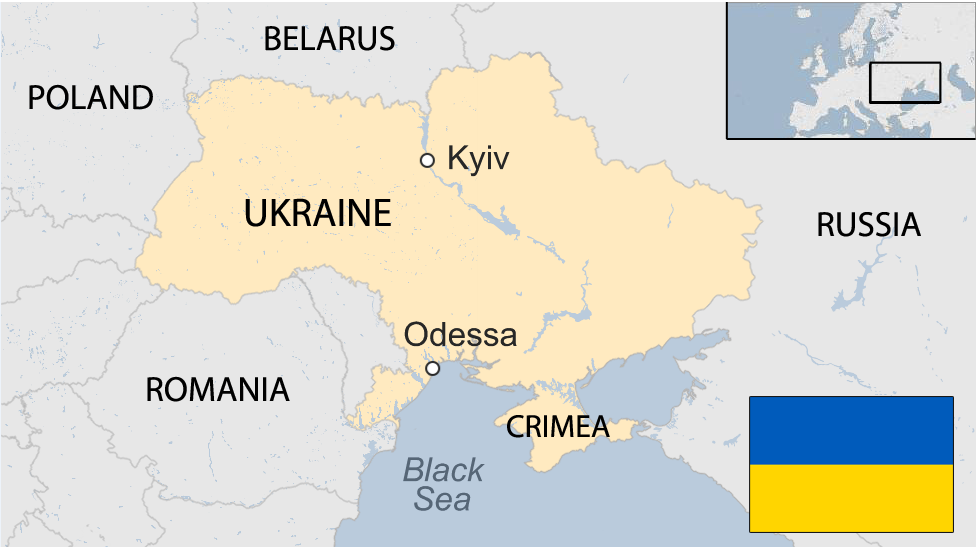From Tbilisi to a tent: What next for the Saakashvili circus?
- Published
Jonah Fisher watched as Mr Saakashvili's car was surrounded by his supporters and Ukrainian police.
It's often said that a circus surrounds Georgia's former president.
Some dismiss him as a clown. But like him or loath him, and few Ukrainians are in-between, there is something of the magician about Mikheil Saakashvili.
The 49-year-old's power for reinvention, and the improbable have created a political persona that no native Ukrainian can match.
This week it seemed inevitable that the next chapter of the Saakashvili story would be set in prison. He'd been arrested at his Kiev home by security officials and bundled into a police van.
Prosecutors were accusing him of receiving funding from an ally of Ukraine's former President Viktor Yanukovych and a lengthy spell in jail, or possibly deportation back to Georgia seemed likely.
In the best Saakashvili tradition, salvation was quite literally just round the corner. Several hundred of his supporters managed to block the police van that was taking him away.

In chaotic scenes, supporters freed Mr Saakashvili from the police car
Hundreds of riot police soon arrived and in most countries you'd expect them to ultimately come out on top.
But this is Ukraine, and memories are still fresh of how violent clashes and state brutality helped turn a relatively small protest into the 2014 Maidan revolution.
The message from Ukraine's leaders in these situations is now clear: avoid at all costs violence that could lead to casualties and martyrs.
So for several hours Mr Saakashvili's supporters wrestled and grappled with the hamstrung police. Pepper spray was used, but not much more, and the crowd steadily pulled and pushed its way closer to Mr Saakashvili's stranded police van.
After three hours of grappling the inevitable occurred and Mr Saakashvili emerged Houdini-like, brandishing a handcuff on one wrist.
"We will go to parliament and call for the impeachment of (President Petro) Poroshenko, who is a thief, who is mega-corrupt and is plundering the whole of Ukraine," he told me just before he was swept through central Kiev by his jubilant supporters.
Friends no more
Two years ago, Mr Saakashvili and President Poroshenko were friends. Ukraine's leader was impressed by the way Mr Saakashvili had run Georgia between 2004 and 2013 and invited him to join Ukrainian political life.
Mr Saakashvili was gifted Ukrainian citizenship and made governor of the port city of Odessa. Perhaps inevitably, given the egos involved, things quickly soured.
Eighteen months later Mr Saakashvili resigned, accusing the president of failing to support him in the fight against corruption. Mr Poroshenko has denied the allegations.
Read more about Mr Saakashvili
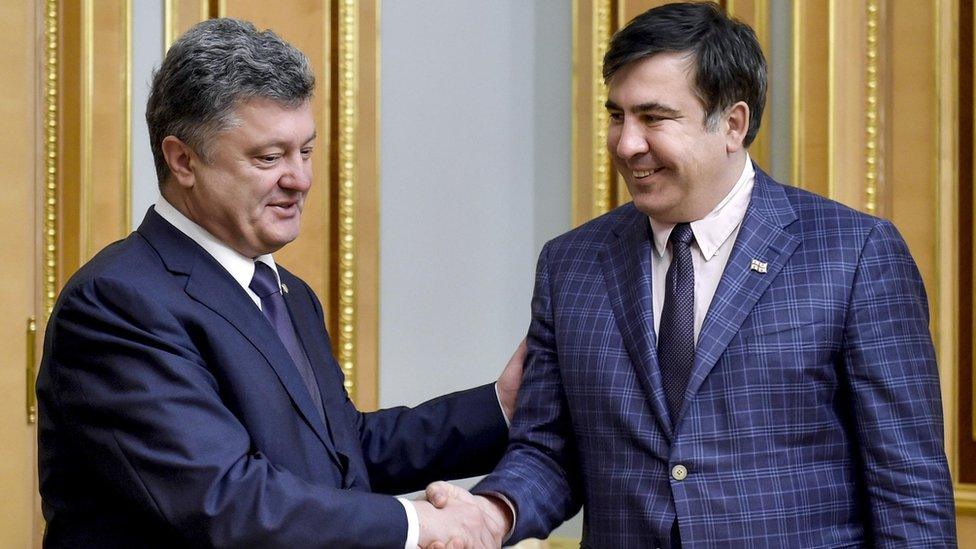
No more smiles or handshakes: Mr Saakashvili (R) now accuses Mr Poroshenko of being a "thief"
Far from retreating into the shadows, or back to his Georgian homeland, Mr Saakashvili reinvented himself yet again, becoming an opposition politician in Ukraine and one of President Poroshenko's most outspoken critics.
Earlier this year, Mr Poroshenko decided he'd had enough and decided to end Mr Saakashvili's Ukrainian adventure.
While Mr Saakashvili was overseas it was announced that his Ukrainian citizenship had been taken away. Having already given up his Georgian passport Mr Saakashvili was now stateless, so he boldly announced that he would return to Ukraine through Poland on 10 September.
Kiev's political class laughed, certain that he'd be stopped. But on September the 10th, Mr Saakashvili did exactly what he'd promised and was swept through the Shehyni border crossing surrounded by supporters and fellow opposition politicians.
From meandering towards obscurity, Mr Saakashvili had, thanks to President Poroshenko, become once again a headline attraction.
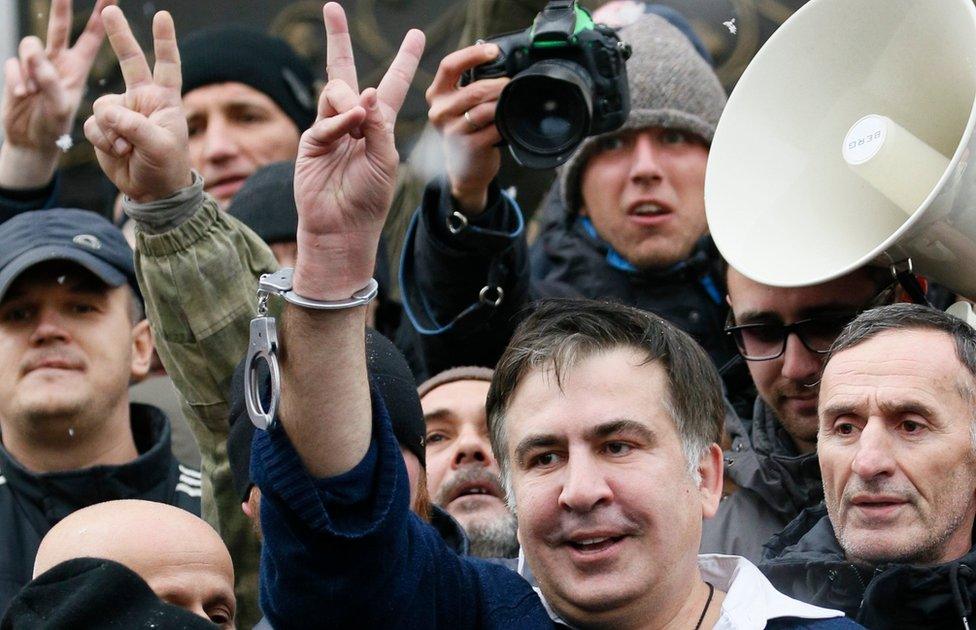
Mr Saakashvili, jubilant after being freed, said the protests would continue
Arriving triumphantly in Kiev, Mr Saakashvili helped establish a tented camp outside Ukraine's parliament. Many of those in it were veterans of the still on-going conflict with Russian backed rebels in eastern Ukraine.
The camps stated aim was to push anti-corruption reforms through parliament but for Mr Saakashvili's the goal has always been much clearer. To nurture a people's revolution similar to the Maidan that would to lead to the removal from office of President Poroshenko.
Mr Poroshenko's critics say he's failed to deliver on his post-Maidan promises.
Ukraine is one of Europe's most corrupt countries and Mr Poroshenko has been accused of delaying efforts to set up a specialised anti-corruption court, while undermining the independence of the agency tasked with investigating corrupt officials.
'Political freak'
For all the drama, and the dissatisfaction with President Poroshenko, Mr Saakashvili's biggest problem is the reaction of the rest of the Ukraine to him.
So far there's little sign of a genuine mass movement forming. Many see him as a political freak, an ego driven sideshow. The snow dusted tented camp only has a couple of hundred occupants, and his rallies have mustered just a few thousand.
Not that the numbers bother Mr Saakashvili. When I spoke to him this week he insisted that he was at least as popular as President Poroshenko and that his rallies were the biggest since the Maidan. While he can't constitutionally be president, he told me he has his eyes on a role in a future government, ideally prime minister.
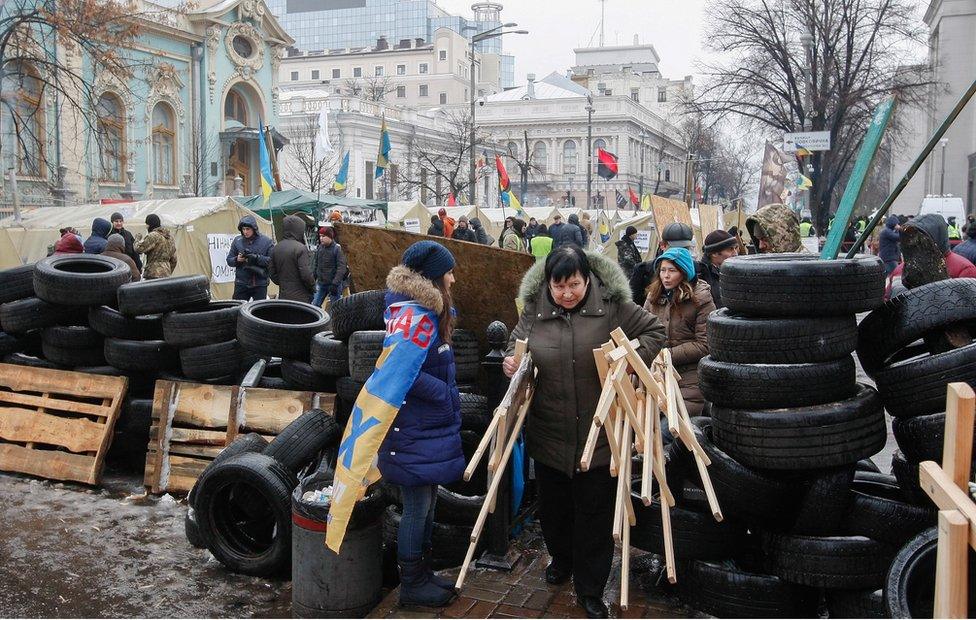
Anti-Poroshenko protesters have set up a camp outside Ukraine's parliament
For now there's the constant fear of arrest. On Tuesday, while Mr Saakashvili was still inside a police van, Ukraine's Prosecutor General Yuriy Lutsenko held a press conference outlining the charges against him.
He claimed that the ex-Georgian was the front man for a "Russian spring", a Kremlin backed campaign to seize power in Ukraine., external
A phone tap was played, allegedly of a phone call between Mr Saakashvili and a businessman called Sergei Kurchenko, who's known to be close to the Russia-leaning former President Viktor Yanukovych.
"It's totally fake," Mr Saakashvili told me from outside his tent. "I don't know a Mr Kurchenko, I don't know how he looks, I don't know how he sounds."
It would certainly be extraordinary if Mr Saakashvili had become some sort of Russian-backed agent-provocateur.
As he likes to frequently remind people, he's spent his entire political career both in Georgia, and now in Ukraine opposed to Moscow and President Putin.
But this is Mikheil Saakashvili. And given his history and powers of reinvention, few are confident enough to completely rule it out.
- Published7 November 2016
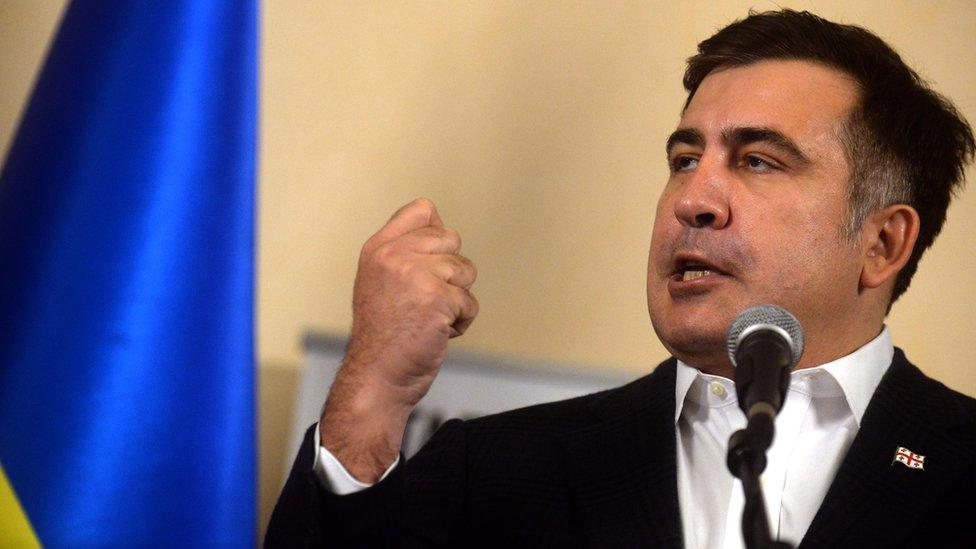
- Published2 June 2015

- Published27 January
